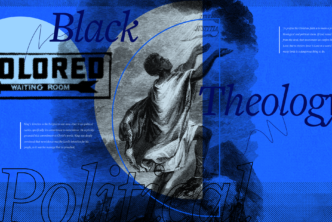In my previous post, I noted that the right context for interpreting the Bible accurately isn’t the history of Christianity in any of its creedal distillations or denominational forms. But I went even further—I said that the biblical context isn’t any modern world context, period. The right context for understanding the Bible is the context that produced the Bible. That seems simple, but experience has taught me that commitment to this patently obvious truth isn’t easy.
The biblical context includes its supernaturalism. The biblical writers believed in an active, animate spiritual world. That world was home to a lot more than the triune God, angels, Satan, and demons. It included other gods (i.e., the gods of the nations were not merely idols) and territorial spiritual beings that were not demons—and were, in fact, superior to demons. It included what we think of as ghosts, who could appear visibly, and even physically, and communicate to the embodied living world of which they had once been a part (1 Sam 28:3–20). For the biblical writers, divine beings could eat, drink, fight, and produce offspring with humans (Gen 6:1–4; 18:1–8; 19:1–11; 32:22–32; Num 13:32–33; 2 Pet 2:4–10; Jude 6–7).
Facing up to the Bible’s ‘weird’ passages
In the biblical worldview, the supernatural unseen realm had its own pecking order. Scripture never says that such intelligent beings always had the same agenda, either. The members of the heavenly host were also created in God’s image (the plurality language of Genesis 1:26 isn’t about the Trinity), so they possess free will—the ability to make decisions. Their acts and attitudes are not programmed and predestined. They believe they can defeat the plans of God, or at least forestall them indefinitely, at great pain to him and great cost to humanity (eternal and otherwise).
Let’s face it—we just don’t think like that. The above isn’t the supernatural world of most Christian traditions. That doesn’t matter if we’re sincere about reading Scripture through the cognitive framework of its writers and original intended audience. But in many cases, especially in evangelical biblical scholarship, the supernatural thinking of the biblical writers has been something to explain away or avoid. I’ve seen it hundreds of times over the course of twenty years of sustained focused study as a biblical scholar. There are many creative ways to explain away what the text plainly says in various “weird” passages.
But understanding Scripture isn’t about making it palatable or comfortable to modern readers. It’s about discerning what the biblical writer believed and was seeking to communicate to readers who thought the same way.
Sincerity and biblical authority
To be blunt, most Christians think themselves believers in the supernatural because they believe in the Trinity, Satan, angels, and demons. They profess Christ and believe in God—and that’s the extent of what they truly think is real in terms of the supernatural. They affirm what they need to affirm to call themselves Christians. The rest is too scary or weird or seems simply superstitious.
When it comes to the supernatural, the question for every Christian who says they believe in biblical inspiration and authority to ask themselves is simple: How much of what biblical characters and writers believed about the supernatural world do I believe? Put negatively: How much of what biblical characters and writers believed about the supernatural world do I feel comfortable dismissing as a modern person?
The answer to these questions will tell you how serious you are about biblical authority on such matters.
***

Dr. Michael S. Heiser is the author of The Unseen Realm: Recovering the Supernatural Worldview of the Bible and Angels: What the Bible Really Says about God’s Heavenly Host.
His newest book, The World Turned Upside Down: Finding the Gospel in Stranger Things, is now on pre-order.
He’s taught many Mobile Ed courses for Faithlife, including Problems in Biblical Interpretation: Difficult Passages I.





